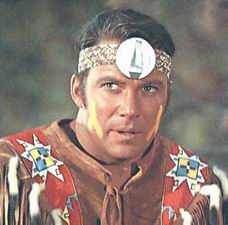The episode evokes this inferiority in several ways, employing well-established cultural strategies. For example, it is quite typical that the White individual coming into the Native American tribe “naturally” takes on a leadership position, thus implying that, even without any of the institutional power he might be able to draw on in his “civilized” life, his superiority is so obvious that even the “natives” notice it. In addition, the apparent lack of social development the episode implies also designates Native Americans as inferior to a humanity as imagined by Star Trek which, it becomes painfully obvious here, does not include every human community. This aspect of the tribe’s image is particularly important, not only because it makes Native Americans different from the core group in Star Trek’s most central social quality, but also because it rules out the possibility of Native Americans ever joining the core group. A community that is unable to adapt to changing social and technological conditions, it seems to be the lesson in Social Darwinism the episode inevitably entails, will have to die sooner or later.
Suppose you were thrust into a pre-Columbian society without technological aids but with your wits intact. Most 21st-century humans wouldn't be able to identify edible plants or create usable weapons. Unable to feed themselves, they'd be lucky to survive more than a few days.
Sure, the modern human might be able to help the locals in a few cases. For instance, he might be able to save an injured Indian with CPR. But for every one of these cases, there would be dozens in which the Indians would have to help him. Overall the modern human would be as pitiful as a young Indian child.
Does The Paradise Syndrome depict this reality? No, of course not. Kirok (Captain Kirk) doesn't need help with anything, and he helps the "primitive" Indians repeatedly. Instead of becoming the tribal charity case, he becomes its "god."
A good corollary to The Paradise Syndrome is Gary Paulsen's Newberry-winning novel The Hatchet. In it, "Brian Robeson is stranded alone in the Canadian wilderness after the pilot of the single-engine Cessna plane in which he is traveling suffers a fatal heart attack." Brian survives only with the help of a hatchet. Without it, you sense he wouldn't have lasted long.
These days, most humans can't survive without technology. But even when he loses his memory, Kirk can. He exemplifies the self-proclaimed superiority of the Western man.
Below: "I can't feed or clothe myself, so naturally I'll be your leader."


No comments:
Post a Comment
Note: Only a member of this blog may post a comment.